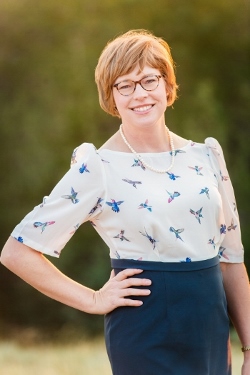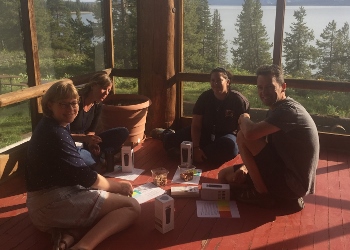LAMP Faculty Of The Month (October, 2017)
Dr. Mariah Ehmke is the October LAMP Faculty Fellow of the month. Dr. Ehmke is an Associate Professor in the Department of Agricultural and Applied Economics. Throughout this academic year, LAMP is providing Mariah with immersive training in active learning and teaching strategies.

Over the summer, Mariah wrote an expansive instructional plan in which she redesigned AGEC 4880: International Agricultural Markets, Trade and Policy. Her first aim for the class was to “Increase active and collaborative learning experiences”. In order to achieve this aim, Mariah integrated daily and cumulative active learning experiences into the course. For example, in order to allow students to experience international trade, Mariah implemented a mock trading experience. She allowed students to self-select into teams based on their interest in different world regions. Within their teams, students were guided by their awareness of what advantages and disadvantages their continent or region faces when trading internationally.
In addition to this type of authentic experience, Mariah also implemented a ‘flipped’
approach in which students do more of the difficult problem solving in class with
their peer team. Throughout the semester students individually research an international
trade policy topic of special interest to them. Throughout the process, they are engaged
in collaborative learning with those around them as they review other’s work. They
provide feedback to each other on their problem statement and approach, model, and
results interpretation. At the end of the semester, each student will present a poster
to their peers, faculty from around the department, and a government expert. In this
presentation, students will continue their peer feedback in the form of a summative
poster review.
When asked what she is planning next for her class, Mariah excitedly relates, “I am also working with an undergraduate TA, to develop a new experiment or game that will illustrate the next model we study. It will be fun because it incorporates labor migration. A few students will be assigned the role of firm manager among for firms in different countries. The rest of the students will be assigned roles in the workforce. We'll then run several simulations of the game where the firms do trade across country borders (Control), trade but the workers can't move to a new country (Treatment 1), trade with worker mobility (Treatment 2), and then trade with worker mobility and differing labor restrictions (e.g., minimum wage in one country) (Treatment 3). We've been developing this new experiment over the last month together and plan to deploy it around the end of this month across a few different class sessions.”
One might think that a complete course restructure to incorporate these active techniques would be enough. But for Mariah, it is just the start. She also redesigned her curriculum to Increase student cultural awareness and engagement with contemporary global trade, environmental, and social challenges. Using inclusive pedagogical approaches, Mariah is asking students to consider high-impact current events such as Brexit, trade sanctions, the Paris Climate Agreement. Students are asked to apply economic inequality measurements to authentic world events. Each student will be researching an international, study abroad opportunity he or she could pursue in the future. In order to facilitate her students’ metacognitive development, they simultaneously journal about the impacts of these experiences on their development!
 |
|
Dr. Ehmke (left) collaborates with a group of faculty and graduate student peers at LAMP’s 2017 Science Initiative Summer Institute in the Tetons. |
On October 3rd, I had the great pleasure of attending Mariah’s class. She began by taking a moment of silence for all of those impacted by the Las Vegas tragedy. She briefly noted that today the class would focus on the Ricardian model and then took attendance and made announcements. One thing that I immediately noted was that she took her time and gave her students plenty of opportunity to consider whether they had questions or contributions.
Mariah asked questions about why trading enhances economy and she received good student interaction because in the class prior, student groups had formed their own ‘countries’ and economies and engaged the aforementioned mock trading.
“If you can sell globally you can improve your economies of scale. This gives different countries a comparative advantage. Today we will develop some mathematical ways to understand this.”
When Mariah asked a question to which the students did not immediately know the answer, she waited for her students to find the appropriate notes; she did not forge ahead in the interest of content coverage. She moved fluidly from the board to the doc cam and back. We call this ‘Shrinking the space’ and it enhances student engagement. Mariah developed the equation for the production function. She used wine and cheese as an example and thus further captured her students’ attention.
“If you happen to have your colored pencils today and your graph paper, now is a great time to use them.”
One of the students started humming the Rocky Anthem and one of the girls who had her colored pencils and graph paper told her forgetful neighbor, “No worries, I got you covered.” Together Mariah and her students graphed the function for the production possibility frontier.
As I watched Mariah and her students work, I am quite certain that the phrase production possibility frontier evoked different meaning for me than it did for them. To me it was a perfect expression for the vast possibilities that are present if we continue to facilitate the meaningful work of incredible teachers like Mariah!
Congratulations Dr. Ehmke! Keep Rocking Students’ Worlds!
- Rachel Watson, 10/9/2017

